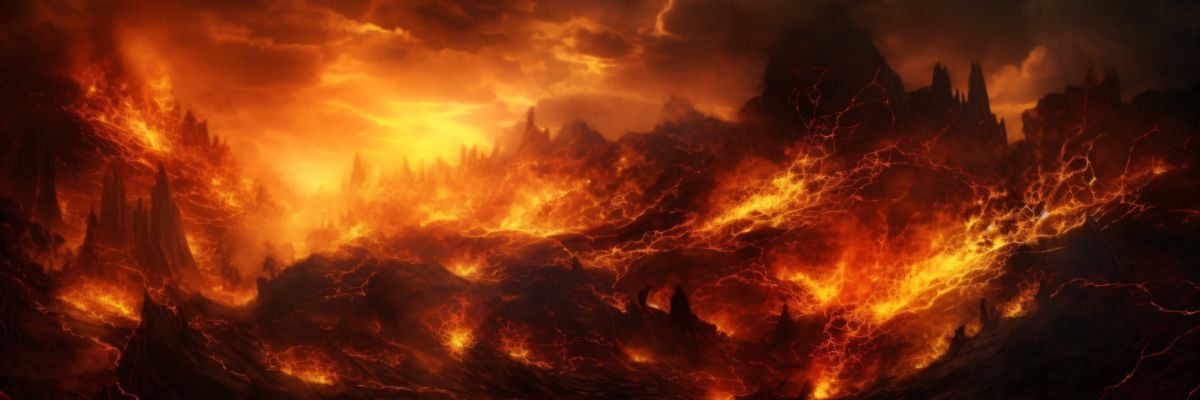
Jimmy Akin delves into the profound question of why God doesn’t erase hell after a certain time. He explores the concept of annihilationism, a minority view in Christianity, and explains why it doesn’t align with biblical descriptions or Catholic teachings. Akin emphasizes that damnation is everlasting, but the Church doesn’t have a definitive teaching on why God doesn’t delete hell.
Transcript:
I was just wondering why God doesn’t delete hell after a certain amount of time. I’m not saying like those suffering in hell are now allowed in. I’m just saying why doesn’t he just erase it instead of forever enduring those creations suffering, whether it was by their choice or not?
Well, there are some people who think he does from a certain point of view, or at least he deletes the people who go to hell. This is a minority view in Christianity. People who believe this are called “annihilationists” because they believe when a person is sent to the lake of fire in Revelation, the fire annihilates them, and so they cease to exist.
That’s problematic because the book of Revelation says that they have no rest day or night, and the smoke of their torment goes up forever and ever. So the way the book of Revelation presents it, you’re not annihilated if you get put in the lake of fire.
Also, in addition to humans going to the lake of fire, demons are thrown into the lake of fire, and they are immortal spirits, so they wouldn’t die either. So it doesn’t look like the purpose of the lake of fire is to actually annihilate people. So this view has always been a minority view in Christianity, and it is not the Catholic view. If you look in the Catechism of the Catholic Church, you’ll see that it holds that damnation is a tragic but real possibility, and that the Church teaches that it is something that is everlasting. It goes on forever. So that would imply God doesn’t delete the people who go to hell, or he doesn’t delete hell itself.
Why does he not do that? Well, here the Church doesn’t have a teaching, so this is a matter that we can speculate on, but we don’t have a certain answer.
According to a common historical speculation, the reason that God doesn’t do it is because, or one of the reasons that God doesn’t do it is because if he did, it wouldn’t satisfy justice. The people who are in hell are people who have chosen to receive justice rather than mercy, and since their sins were against an infinite God, justice would require that they pay an infinite price. And any finite, any limited time spent suffering is not going to pay a finite price if you’re a finite human being.
So the only way that a finite human being could fully experience justice, the justice that they had chosen, is if they suffer forever, because that’s the only way you pay an infinite price if you’re a finite human being.
So the justice argument is one that has been proposed in the past. There are other speculations, though, too, that don’t depend on that understanding of justice. For example,
one of the things that it has been pointed out is that existence itself is good, and even if your existence is not perfectly comfortable,
even if you have frustration because you’ve cut yourself off from the source of all joy, it’s still better to exist than not exist. And so God is still being generous on this speculation, even to the people in hell, by allowing them to continue to exist. The pains of hell on this view do not outweigh the goods that the people who are in hell are still receiving. Now, that may seem counterintuitive, given the imagery of fire, for example, that’s associated with hell, because humans find fire extremely painful. But,
you know, that’s imagery, and we don’t know what it really corresponds to in the afterlife. So it could very well be that, you know, even though there’s some frustration and some, you know, pain of an emotional sort or whatever for those in hell in the afterlife, it still doesn’t counterbalance the good that they’re receiving, the chance to still exist. And so that could be why God doesn’t delete them. He’s actually being merciful by keeping them in existence, despite the fact that they’ve cut themselves off from him as the source of all goodness. So those are two speculations. Then there’s the, well, you know, to be honest, we don’t fully know because God hadn’t told us everything about this. And so these are possible speculations, but there’s still an element of mystery here.
And so there remains room for discussion and debate on this subject.
Hey, thanks for watching. If you like this Catholic answer, be sure to like, subscribe, and check out our live streams Monday through Friday, 3 to 5 p.m. Pacific, or find the episode after on YouTube, your favorite podcast platform, or our Catholic Answers app.



